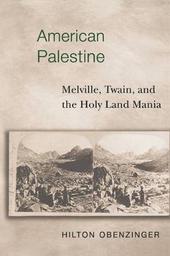
|
American Palestine: Melville, Twain, and the Holy Land Mania
Paperback / softback
Main Details
| Title |
American Palestine: Melville, Twain, and the Holy Land Mania
|
| Authors and Contributors |
By (author) Hilton Obenzinger
|
| Physical Properties |
| Format:Paperback / softback | | Pages:320 | | Dimensions(mm): Height 254,Width 197 |
|
| Category/Genre | Literary studies - c 1800 to c 1900
Literary studies - fiction, novelists and prose writers |
|---|
| ISBN/Barcode |
9780691009735
|
| Classifications | Dewey:810.9325694 |
|---|
| Audience | | Professional & Vocational | | Tertiary Education (US: College) | |
|---|
|
Publishing Details |
| Publisher |
Princeton University Press
|
| Imprint |
Princeton University Press
|
| Publication Date |
14 November 1999 |
| Publication Country |
United States
|
Description
In the nineteenth century, American tourists, scholars, evangelists, writers, and artists flocked to Palestine as part of a "Holy Land mania." Many saw America as a New Israel, a modern nation chosen to do God's work on Earth, and produced a rich variety of inspirational art and literature about their travels in the original promised land, which was then part of Ottoman-controlled Palestine. In American Palestine, Hilton Obenzinger explores two "infidel texts" in this tradition: Herman Melville's Clarel: A Poem and Pilgrimage to the Holy Land (1876) and Mark Twain's The Innocents Abroad: or, The New Pilgrims' Progress (1869). As he shows, these works undermined in very different ways conventional assumptions about America's divine mission. In the darkly philosophical Clarel, Melville found echoes of Palestine's apparent desolation and ruin in his own spiritual doubts and in America's materialism and corruption. Twain's satiric travelogue, by contrast, mocked the romantic naivete of Americans abroad, noting the incongruity of a "fantastic mob" of "Yanks" in the Holy Land and contrasting their exalted notions of Palestine with its prosaic reality.Obenzinger demonstrates, however, that Melville and Twain nevertheless shared many colonialist and orientalist assumptions of the day, revealed most clearly in their ideas about Arabs, Jews, and Native Americans. Combining keen literary and historical insights and careful attention to the context of other American writings about Palestine, this book throws new light on the construction of American identity in the nineteenth century.
Author Biography
Hilton Obenzinger is a critic, novelist, and poet. Winner of the American Book Award, his previous works include New York on Fire and Cannibal Eliot and the Lost Histories of San Francisco. He teaches American literature and writing at Stanford University.
Reviews"American Palestine is an incisive, well-informed, and consistently engaging book."--Robert Milder, Nineteenth-Century Literature
|